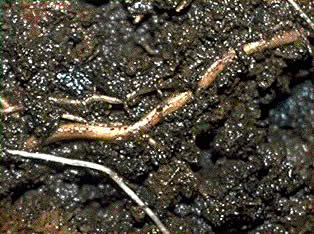The Soil: The Rhizosphere
The rhizosphere (which includes the rhizoplane or root surface) is the zone of soil which is influenced by the root.
It has been estimated that up to 20% of the total carbon photosynthesized by plants is actively or passively released
from living roots into this zone in the form of organic compounds such as sugars and amino and organic acids.
A host of soil microorganisms, including bacteria, fungi and algae feed on these compounds and are in turn fed on
by soil microfauna such as protozoa, nematodes (which may also feed on roots), mites and collembola (springtails).
Bacteria are the most numerous rhizosphere inhabitants, numbering up to 3 billion per gram of soil and comprising 0.03 - 0.3 % of the total soil mass, (or up to 3 t/ha).

A close-up photo of fine eucalypt roots (the largest root pictured is about 1 mm in diameter) in situ illustrating the intimate relationship between root and soil.
